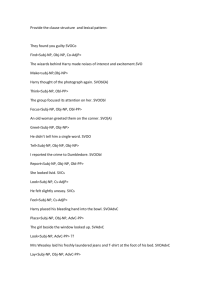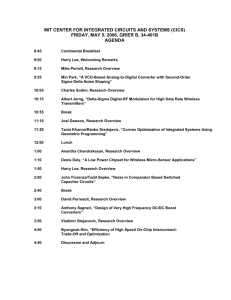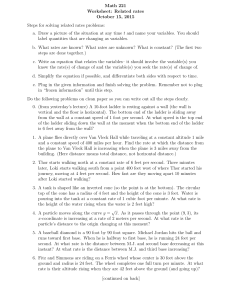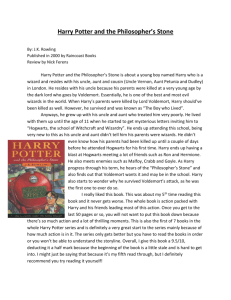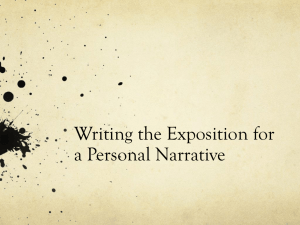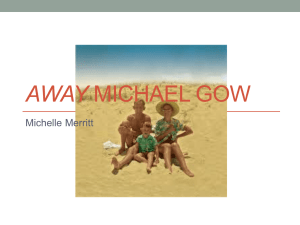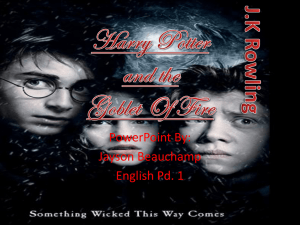Sparknotes Discussion Guide for Goblet of Fire
advertisement
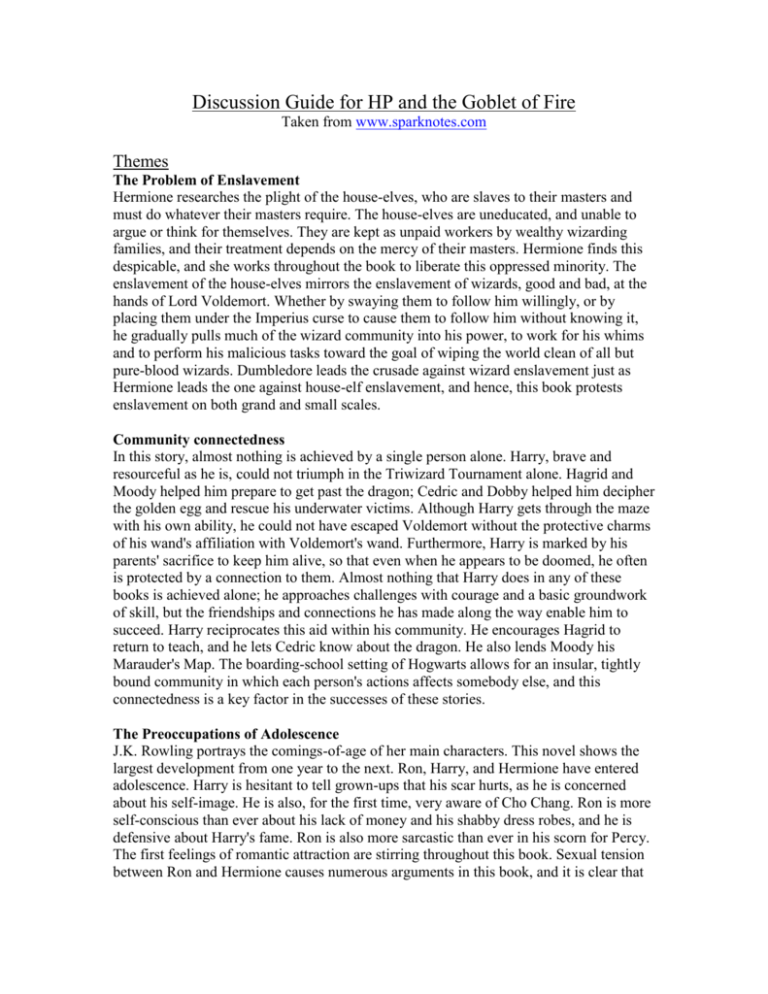
Discussion Guide for HP and the Goblet of Fire Taken from www.sparknotes.com Themes The Problem of Enslavement Hermione researches the plight of the house-elves, who are slaves to their masters and must do whatever their masters require. The house-elves are uneducated, and unable to argue or think for themselves. They are kept as unpaid workers by wealthy wizarding families, and their treatment depends on the mercy of their masters. Hermione finds this despicable, and she works throughout the book to liberate this oppressed minority. The enslavement of the house-elves mirrors the enslavement of wizards, good and bad, at the hands of Lord Voldemort. Whether by swaying them to follow him willingly, or by placing them under the Imperius curse to cause them to follow him without knowing it, he gradually pulls much of the wizard community into his power, to work for his whims and to perform his malicious tasks toward the goal of wiping the world clean of all but pure-blood wizards. Dumbledore leads the crusade against wizard enslavement just as Hermione leads the one against house-elf enslavement, and hence, this book protests enslavement on both grand and small scales. Community connectedness In this story, almost nothing is achieved by a single person alone. Harry, brave and resourceful as he is, could not triumph in the Triwizard Tournament alone. Hagrid and Moody helped him prepare to get past the dragon; Cedric and Dobby helped him decipher the golden egg and rescue his underwater victims. Although Harry gets through the maze with his own ability, he could not have escaped Voldemort without the protective charms of his wand's affiliation with Voldemort's wand. Furthermore, Harry is marked by his parents' sacrifice to keep him alive, so that even when he appears to be doomed, he often is protected by a connection to them. Almost nothing that Harry does in any of these books is achieved alone; he approaches challenges with courage and a basic groundwork of skill, but the friendships and connections he has made along the way enable him to succeed. Harry reciprocates this aid within his community. He encourages Hagrid to return to teach, and he lets Cedric know about the dragon. He also lends Moody his Marauder's Map. The boarding-school setting of Hogwarts allows for an insular, tightly bound community in which each person's actions affects somebody else, and this connectedness is a key factor in the successes of these stories. The Preoccupations of Adolescence J.K. Rowling portrays the comings-of-age of her main characters. This novel shows the largest development from one year to the next. Ron, Harry, and Hermione have entered adolescence. Harry is hesitant to tell grown-ups that his scar hurts, as he is concerned about his self-image. He is also, for the first time, very aware of Cho Chang. Ron is more self-conscious than ever about his lack of money and his shabby dress robes, and he is defensive about Harry's fame. Ron is also more sarcastic than ever in his scorn for Percy. The first feelings of romantic attraction are stirring throughout this book. Sexual tension between Ron and Hermione causes numerous arguments in this book, and it is clear that much of the book's events reflect subtle changes within the maturing process of the characters themselves. Motifs Fallen Façades J. K. Rowling works to dispel our preconceived notions about the Harry Potter characters and about the magical world that they inhabit. Her presentation of the merpeople is one example of challenging a façade. She plays to our expectations with a beautiful, shapely, stereotypical mermaid in the painting in the prefects' bathroom; then, underwater, she reveals a village of hideous creatures with long, green, tangled hair, sallow gray skin, broken yellow teeth, and eerie appearances. They are not remotely what we think Harry will find at the bottom of the lake, and they are not supposed to be, for even mythology must have its secrets, and even Harry, who is still learning about the wizard world, has his own, often misguided, notions about how things should be. The same is true of MadEye Moody, who is among Harry's favorite teachers before he reveals himself to be the villain responsible for placing Harry directly within Voldemort's line of fire. Again, Snape proves himself to be innocent, although all of the signs point otherwise. Almost nothing in this book is what it seems, teaching the reader not to jump to conclusions, but to gather evidence slowly and to prepare to expect the unexpected. Symbols Blast-Ended Skrewts When Hagrid introduces the class to the blast-ended Skrewts, he makes a distinction between the males and females. The former have stings, and the latter have suckers on their bellies. This comparison is symbolic of the adolescent need to make more of a distinction between the sexes. Ron also notices in this book, for the first time, that Hermione is in fact a girl, and Harry finds himself daydreaming not about fame or glory, but about Cho Chang. Speech Different characters' speech patterns reveal their levels of education. Wizards speak in proper English, and Hagrid, who is half-giant and not fully educated, drops his H's and slurs his words together a bit sloppily. House-elves have no sophisticated mastery of language. They use terrible grammar, referring to themselves in third person and using almost exclusively short, exclamatory sentences. They speak in a manner inferior to that of wizards, and they cannot express themselves clearly or persuasively. Quotes 1. "You know, house-elves get a very raw deal!" said Hermione indignantly. "It's slavery, that's what it is! That Mr. Crouch made her go up to the top of the stadium, and she was terrified, and he's got her bewitched so she can't even run when they start trampling tents! Why doesn't anyone do something about it?" Hermione sets out to combat inequality within the wizard world in this novel. In this passage from Chapter Nine, she notes the oppression of the house-elves at the hands of careless masters, which upsets her. Although Ron and Harry tend to take her diatribes lightly, she is trying to create a world in which all magical beings have freedom of choice, and in which nobody is treated unfairly on account of status, heritage, or race. Both Voldemort and poor house-elf masters (such as the Malfoys) force servants into terrible situations; Hermione does on a small scale what the adult characters of the novel carry out on a larger scale. 2. "Just because it's taken you three years to notice, Ron, doesn't mean no one else has spotted I'm a girl!" The main characters are now fourteen years old, on the brink of adolescence. Sexual tension becomes a prominent point in this novel. Beginning with the great male drooling over the Veela at the Quidditch World Cup and continuing when Hagrid explains the distinctions between male and female Skrewts, this inter- gender strife heightens in this passage from Chapter Twenty-two, when Ron is dumfounded that Hermione has been asked to go to the ball as someone else's date. 3. "Oh no, sir, no," said Dobby, looking suddenly serious. "'Tis part of the house- elf's enslavement, sir. We keeps their secrets and our silence, sir. We upholds the family honor, and we never speaks ill of them—though Professor Dumbledore told Dobby he does not insist upon this. Professor Dumbledore said we is free to—to—" Dobby looked suddenly nervous and beckoned Harry closer. Harry bent forward. Dobby whispered, "He said we is free to call him a—barmy old codger if we likes, sir!" Dobby gave a frightened sort of giggle. "But Dobby is not wanting to, Harry Potter," he said, talking normally again, and shaking his head so that his ears flapped. "Dobby likes Professor Dumbledore very much, sir, and is proud to keep his secrets and our silence for him." This passage from Chapter Twenty-one demonstrates the lack of education given the house-elves and the reason that Dumbledore is the most widely admired wizard. Dumbledore, unlike Snape, Karkaroff, and Wormtail, does not make decisions that he regrets. He allows people to know much about his life—not reprimanding Harry for looking into his Pensieve. He is confident enough of his skill as a teacher, and as a result gives students a great deal of freedom. Dubledore foresees the trouble students can cause and deals with it, demonstrated when the Weasley twins' attempt to register for the Triwizard compitition causes them to grow beards. Here, he allows Dobby full rein as an employee, and we see that Dobby, who detested her previous masters, wishes to live up to Dumbledore's trust. In his concession that Dobby can call him a barmy old codger, Dumbledore ought to know that of course it will never happen, as he is inherently not one in his having given Dobby that assurance of freedom. 4. Here and there at the dark windows, Harry saw faces - faces that bore no resemblance at all to the painting of the mermaid in the prefects' bathroom. The merpeople had grayish skin and long, wild, dark green hair. Their eyes were yellow, as were their broken teeth, and they wore thick ropes of pebbles around their necks. As we observe Harry observing the merpeople in Chapter Twenty-six, we have a wonderfully shocking vision of the unexpected. In contrast to our expectation of a beautiful, shapely, stereotypical mermaid like the one that Harry sees in the painting in the prefects' bathroom, we see a village of hideous, crusty creatures. They are not remotely what we expect Harry to find at the bottom of the lake. Mermaids, the ultimate illusion of beauty, can in fact be quite ugly. This disenchantment parallels many of the coming disenchantments, such as Mad- Eye Moody's revelation that he is the villain responsible for placing Harry directly within Voldemort's line of fire. As shown in this passage and others, reality is rarely how we imagine it will be. 5. "No good sittin' worryin' abou' it," he said. "What's comin' will come, an' we'll meet it when it does." Hagrid's comment from Chapter Thirty-seven reflects the fact that wizards must simply wait for Voldemort to make his next move. It is appropriate and refreshing for it to come from Hagrid, because although he does not have Dumbledore's eloquence or trained wisdom, he is speaks as someone who has undergone accusation and hardship. He, of all people, should know that the most terrible things can never be predicted. This comment allows the characters to relax during a calm summer, letting life continue, but acknowledging that it will not be perfect, especially not in the near future. This line offers a realistic closure to one stage of the constant battle against evil in the wizarding world. Study Questions Why must Harry leave familiar Hogwarts territory before facing Voldemort? And why would he be safe over the summer at the Dursleys? Is Hermione correct in her crusade against poor living conditions for house- elves? Why do Voldemort's victims return to help Harry? Suggested essay topics How does the true appearance of the merpeople foreshadow the ending of the book? What other greater struggles does Hermione's struggle for house-elf liberation parallel?

